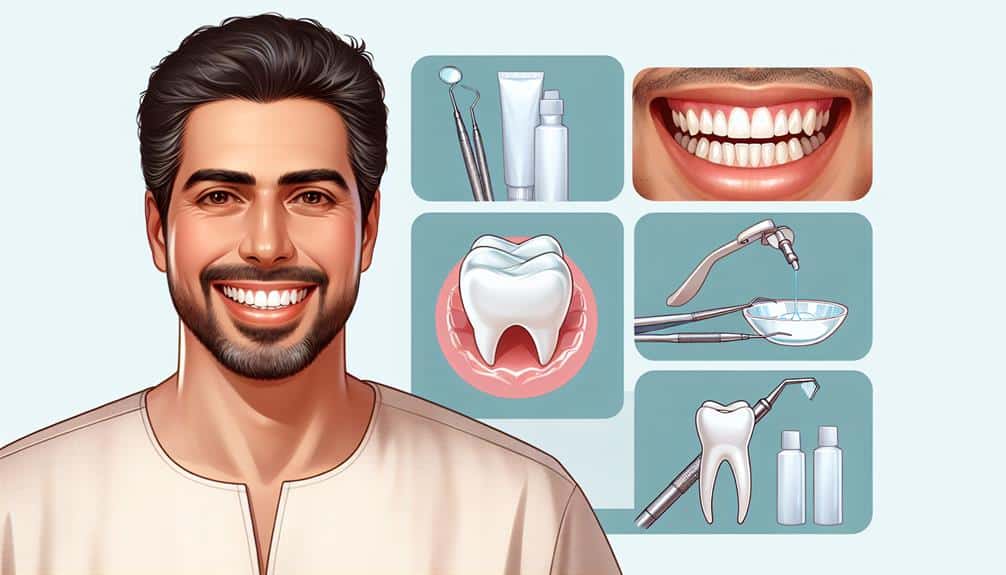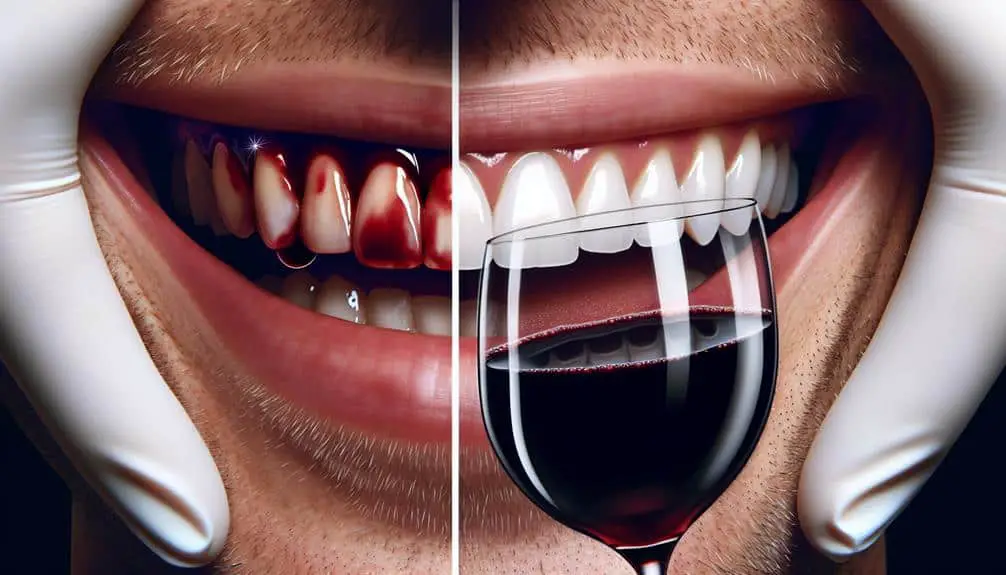Lemon juice benefits your smile by fighting gum inflammation, bad breath, and oral infections. The Vitamin C in lemons strengthens your gums naturally. Its citric acid acts as a gentle bleaching agent, reducing stains on your teeth's surface for a brighter smile. Remember, the high acidity of lemon juice can erode enamel, leading to tooth sensitivity. Safely dilute it with water, apply gently with a soft brush, and rinse after use. To explore more dental health tips and alternatives for whitening, keep discovering ways to enhance your smile healthily.
Key Points
- Lemon juice combats gum inflammation and strengthens gums with Vitamin C.
- Antibacterial properties in lemon juice fight mouth bacteria, reducing bad breath.
- Citric acid in lemons acts as a natural bleaching agent for a brighter smile.
- Lemon juice helps prevent oral infections and contributes to overall oral health.
- Properly diluted lemon juice can reduce stains on teeth's surface for whitening.
Benefits of Using Lemon Juice
When incorporating lemon juice into your dental care routine, you can experience a range of benefits that contribute to a healthier smile. Citrus benefits found in lemon juice can aid in promoting oral health. Lemons are packed with vitamin C, which can help combat gum inflammation and strengthen gums. The antibacterial properties of lemon juice may also assist in fighting bacteria in the mouth, potentially reducing bad breath and preventing oral infections.
Moreover, the natural remedies present in lemon juice offer a gentle way to brighten your smile. The citric acid in lemons acts as a natural bleaching agent that can help lighten teeth stains over time. However, it's essential to use lemon juice cautiously as its acidic nature can erode tooth enamel if not diluted properly. To maximize the benefits of lemon juice for your oral health, consider using it in moderation and always rinse your mouth thoroughly after use to protect your teeth.
How Lemon Juice Whitens Teeth
To enhance the natural whiteness of your teeth, lemon juice can be utilized as a mild bleaching agent due to its citric acid content. The acidic properties of lemon juice make it a natural bleaching agent that can help reduce stains on the teeth's surface. Citric acid, found abundantly in lemons, is effective in breaking down the molecules that cause discoloration. When applied to the teeth, the citric acid interacts with the stained areas and works to lighten them, leading to a brighter smile.
However, it's essential to be cautious when using lemon juice for teeth whitening. The high acidity of lemon juice can potentially lead to enamel erosion if used excessively or over prolonged periods. Enamel erosion weakens the protective layer of the teeth, making them more susceptible to damage and sensitivity. To mitigate this risk, it's advisable to use lemon juice in moderation and consider rinsing your mouth with water after application to help neutralize the acidity.
Risks and Precautions to Consider
Consideration of the risks and precautions associated with using lemon juice for teeth whitening is important to safeguard your oral health. While lemon juice can help whiten teeth, it's crucial to be aware of potential dangers.
Lemon juice is highly acidic, which can erode tooth enamel over time, leading to increased tooth sensitivity and a higher risk of cavities. To minimize these risks, proper dilution of lemon juice is crucial. It's recommended to mix lemon juice with water to lower its acidity before applying it to your teeth.
Additionally, using a straw when consuming lemon juice can help reduce direct contact with your teeth, further protecting them from potential damage. It's important to avoid leaving lemon juice on your teeth for extended periods and to rinse your mouth thoroughly after using it for whitening purposes.
Tips for Safely Applying Lemon Juice
For safe application of lemon juice on your teeth, make sure to properly dilute it with water to lower acidity levels and safeguard tooth enamel from potential damage. Citrus sensitivity is a common concern when using lemon juice for oral hygiene. Diluting the lemon juice can help reduce the risk of sensitivity reactions. It's recommended to mix equal parts of lemon juice and water to create a safer solution for your teeth.
When applying the diluted lemon juice to your teeth, use a soft-bristled toothbrush and gently brush the solution onto your teeth. Avoid brushing aggressively, as this can wear down the enamel and cause sensitivity. Limit the application of lemon juice to a few times a week to prevent overexposure to acid, which can erode tooth enamel over time.
After applying the lemon juice, rinse your mouth thoroughly with water to remove any residual acid. Remember to wait at least 30 minutes before brushing your teeth to allow the enamel to reharden. By following these tips, you can safely incorporate lemon juice into your oral hygiene routine without causing harm to your teeth.
Alternatives to Lemon Juice for Whitening
Looking to brighten your smile without using lemon juice? There are safe and effective alternatives that you can consider. Two popular options for whitening your teeth are baking soda and hydrogen peroxide.
Baking soda is a mild abrasive that can help remove surface stains on your teeth. You can create a paste by mixing a small amount of baking soda with water and brushing your teeth gently with this mixture. However, it's important to use baking soda sparingly as excessive use can wear down tooth enamel.
Hydrogen peroxide is another common ingredient found in whitening products. It works by breaking down stains on the surface of your teeth. You can use hydrogen peroxide as a mouthwash by diluting it with water. It's vital to follow the recommended guidelines for dilution to avoid any irritation to your gums or oral tissues.
Both baking soda and hydrogen peroxide can be effective alternatives to lemon juice for whitening your teeth. Remember to use them in moderation and consult with your dentist if you have any concerns about teeth whitening methods.
Frequently Asked Questions
Can Lemon Juice Be Used as a Replacement for Regular Toothpaste?
Using lemon juice as a toothpaste replacement is not recommended due to its acidic properties. DIY options with natural ingredients can be gentle alternatives, but lemon juice can contribute to enamel erosion if used frequently.
Are There Any Potential Negative Effects on Dental Fillings or Crowns When Using Lemon Juice for Whitening?
When using lemon juice for whitening, be cautious of its effects on fillings and crowns. The acidity may damage these dental works. Additionally, lemon juice can cause sensitivity concerns, so consult your dentist for safer alternatives.
How Often Should Lemon Juice Be Applied to See Noticeable Results in Teeth Whitening?
For best teeth whitening results using lemon juice, apply it every other day. Gently rub the juice on your teeth for 1-2 minutes, then rinse thoroughly. Consistent application over a few weeks can lead to noticeable improvements in the whiteness of your smile.
Can Using Lemon Juice for Teeth Whitening Cause Increased Sensitivity in the Teeth?
Using lemon juice for teeth whitening can indeed cause increased tooth sensitivity. To prevent this, limit exposure and consider treatments like fluoride toothpaste or desensitizing agents. Citrus acidity can lead to enamel erosion.
Are There Any Specific Types of Lemons That Are Better for Teeth Whitening Than Others?
When it comes to using lemon juice for teeth whitening, certain lemon varieties like Meyer lemons are often preferred due to their milder acidity. While there are benefits to whitening, risks include potential damage to enamel from citric acid in citrus fruits.



